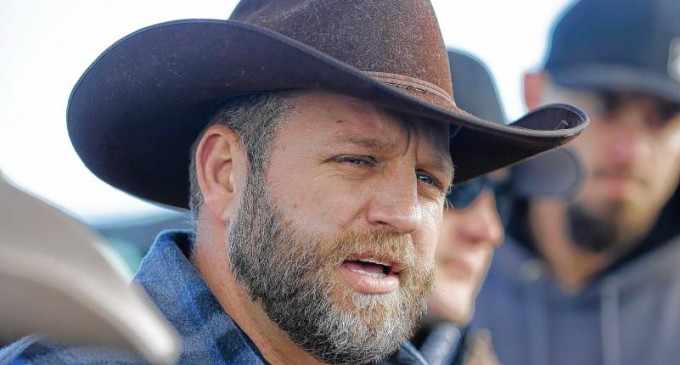
The Federal government does not like to be challenged, and it has the resources and the power to make citizens yield, and does so when it cannot win the argument. If you have been following the conflict in Oregon recently between ranchers and the Federal government, you will know that the government, which owns over 50% of the land in eleven western states, is willing to jail you for unintended trespass of undeveloped, unoccupied land.
Two ranchers who did some brush clearing of their own ranch, but inadvertently burned some of the adjoining federal land, are now in prison for a long stay, based on a charge of arson. It is worth pointing out that the fire they started was put out by the ranchers without outside help, and the land itself is actually now healthier and more productive due to the reduction of brush and overgrowth. But the government wants to make sure that everyone understands they are in charge and they have the power.
A small group of ranchers, led by Ammon Bundy, are occupying the Malheur National Wildlife Refuge building in protest of the unjust sentence and the overbearing government position. Fortunately, no violence has developed, but Bundy and his group have vowed to stay until the two ranchers in question are freed. But the government still wants to make a strong point, and they have enlisted a judge to help them.
Huge fine threatened, page 2:

May God Bless and protect your people and your lawful courage Ammon. Keep it up.
Don’t pay anything!!!
Hang the judge
Ryan Bronson What crime have they Committed? Are you serious? That land wasn’t stolen. They are trespassing for one, various weapons charges, illegal seizure, Extortion and many other illegal acts. The constitution gives the fed gov’t right to own land. Obviously you didn’t read it. http://www.politifact.com/punditfact/statements/2014/apr/28/andrew-napolitano/napolitano-washington-lacks-constitutional-right-o/
Sue b.l.m for disrupting businesses
https://en.wikipedia.org/wiki/Federal_lands
“Clause 2: Property Clause
The Congress shall have power to dispose of and make all needful Rules and Regulations respecting the Territory or other Property belonging to the United States; and nothing in this Constitution shall be so construed as to Prejudice any Claims of the United States, or of any particular State.[10]
This clause, commonly known as the Property or Territorial Clause, grants Congress the constitutional authority for the management and control of all territories or other property owned by United States. Additionally, the clause also proclaims that nothing contained within the Constitution may be interpreted to harm (prejudice) any claim of the United States, or of any particular State. The exact scope of this clause has long been a matter of debate.
The federal government owns or controls about thirty percent of the land in the United States. These holdings include national parks, national forests, recreation areas, wildlife refuges, vast tracts of range and wasteland managed by the Bureau of Land Management, reservations held in trust for Native American tribes, military bases, and ordinary federal buildings and installations. Although federal property can be found in every state, the largest concentrations are in the west, where, for example, the federal government owns over eighty percent of the land within Nevada.[11]
Pursuant to a parallel clause in Article One, Section Eight, the Supreme Court has held that states may not tax such federal property. In another case, Kleppe v. New Mexico, the Court ruled that the Federal Wild Horse and Burro Act was a constitutional exercise of congressional power under the Property Clause – at least insofar as it was applied to a finding of trespass. The case prohibited the entering upon the public lands of the United States and removing wild burros under the New Mexico Estray Law.[12]
A major issue early in the 20th century was whether the whole Constitution applied to the territories called insular areas by Congress. In a series of opinions by the Supreme Court of the United States, referred to as the Insular Cases, the Court ruled that territories belonged to, but were not part of the United States. Therefore, under the Territorial clause Congress had the power to determine which parts of the Constitution applied to the territories. These rulings have helped shape public opinion among Puerto Ricans during the ongoing debate over the commonwealth’s political status.”
lies. no one is charging any one with any fees out there . where the hell do some of these face book post get their stupidity from ?
Tar and feather the judge.
If he puts black polish on his face he can charge the county around seven million for racism…….